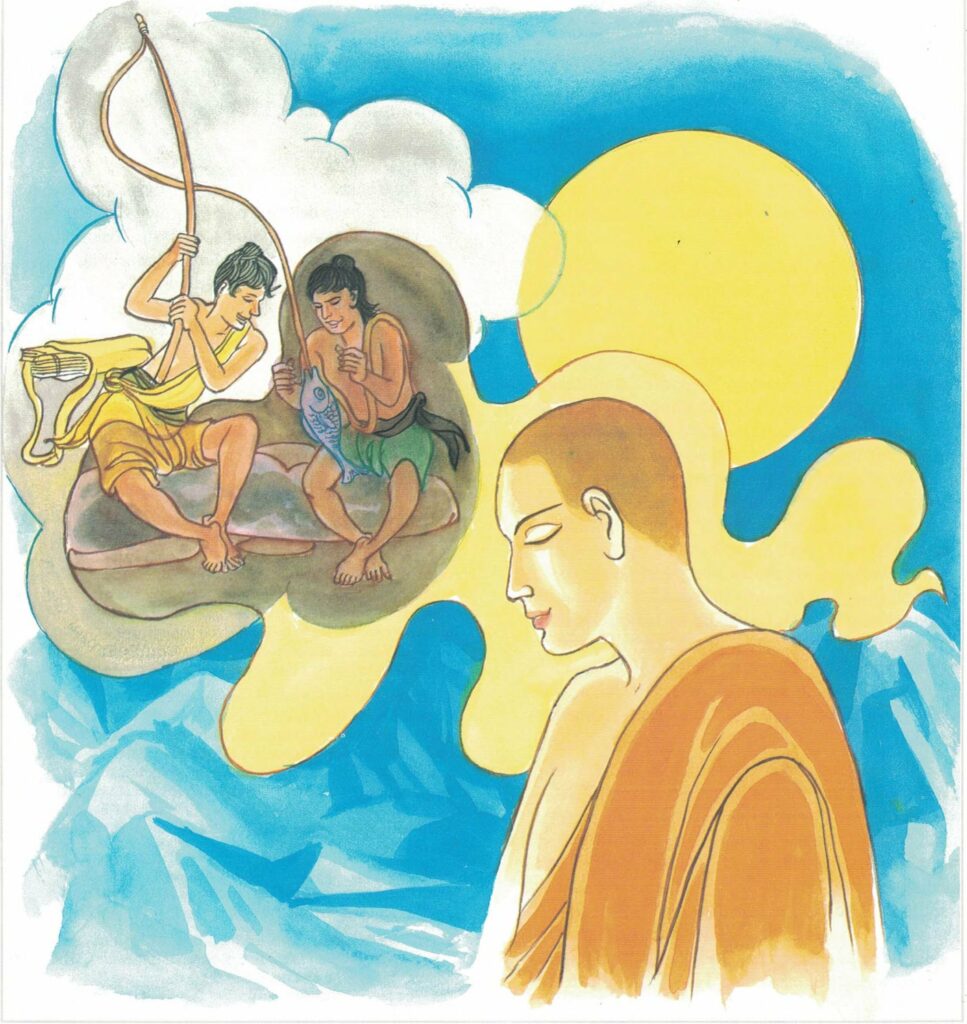Pali text, illustration and English translation of Dhammapada verse 173:
yassa pāsaṃ kataṃ kammaṃ kusalena pithīyati |
so imaṃ lokaṃ pabhāseti abbhā mutto’va candimā || 173 ||
173. Whoso by wholesome kamma covers up the evil done illumines all this world as moon when free from clouds.

The Story of Venerable Angulimāla
While residing at the Jetavana Monastery, the Buddha spoke this verse, with reference to Venerable Angulimāla.
Angulimāla was the son of the head-priest in the court of King Pasenadi of Kosala. His original name was Ahiṃsaka. When he was of age, he was sent to Taxilā, the renowned university town. Ahiṃsaka was intelligent and was also obedient to his teacher. So he was liked by the teacher and his wife: as a result, other pupils were jealous of him. So they went to the teacher and falsely reported that Ahiṃsaka was having an affair with the teacher’s wife. At first, the teacher did not believe them, but after being told a number of times he believed them: and so he vowed to have revenge on the boy. To kill the boy would reflect badly on him: so he thought of a plan which was worse than murder. He told Ahiṃsaka to kill one thousand men or women and in return he promised to give the boy priceless knowledge. The boy wanted to have this knowledge, but was very reluctant to take life. However, he agreed to do as he was told. Thus, he kept on killing people, and not to lose count, he threaded a finger each of everyone he killed and wore them like a garland round his neck. In this way, he was known as Angulimāla, and became the terror of the countryside. The king himself heard about the exploits of Angulimāla, and he made preparations to capture him. When Mantāni, the mother of Angulimāla, heard about the king’s intention, out of love to her son, she went into the forest in a desperate bid to save her son. By this time, the chain round the neck of Angulimāla had nine hundred and ninety-nine fingers in it, just one finger short of one thousand.
Early in the morning on that day, the Buddha saw Angulimāla in his vision, and reflected that if he did not intervene, Angulimāla, who was on the look out for the last person to make up the one thousand, would see his mother and might kill her. In that case, Angulimāla would have to suffer in niraya endlessly. So out of compassion, the Buddha left for the forest where Angulimāla was. Angulimāla, after many sleepless days and nights, was very tired and near exhaustion. At the same time, he was very anxious to kill the last person to make up his full quota of one thousand and so complete his task. He made up his mind to kill the first person he met. Suddenly, as he looked out he saw the Buddha and ran after him with his knife raised. But the Buddha could not be reached while he himself was completely exhausted. Then, looking at the Buddha, he cried out, “O monk, stop! Stop!” and the Buddha replied, I have stopped, only you have not stopped.” Angulimāla did not get the significance of the words of the Buddha, so he asked, “O monk! Why do you say that you have stopped and I have not stopped?”
The Buddha then said to him, I say that I have stopped, because I have given up killing all beings, I have given up ill-treating all beings, and because I have established myself in universal love, patience, and knowledge through reflection. But, you have not given up killing or ill-treating others and you are not yet established in universal love and patience. Hence, you are the one who has not stopped.” On hearing these words from the mouth of the Buddha, Angulimāla reflected, “These are the words of a wise man. This monk is so very wise and so very brave: he must be the Buddha himself! He must have come here specially to make me see the light.” So thinking, he threw away his weapon and asked the Buddha to admit him to the order of the monks. Then and there, the Buddha made him a monk.
Explanatory Translation (Verse 173)
yassa kataṃ pāpaṃ kammaṃ kusalena pithīyati
so abbhā mutto candimā iva imaṃ lokaṃ pabhāseti
yassa: if by someone; kataṃ pāpaṃ kammaṃ [kamma]: evil action done; kusalena: by good; pithīyati: is stopped; so: he; abbhā mutto [mutta]: escaped from a dark cloud; candimā iva: like the moon; imaṃ lokaṃ [loka]: this world; pabhāseti: illumines
If the evil habits of behaviour of an individual get replaced by his good behaviour, he will illumine the world.
Commentary and exegetical material (Verse 173)
This verse was pronounced with reference to Angulimāla. He is one of the most famous and extremely colourful of the disciples of the Buddha.
kusalena pithīyati: One has to reap the effects of one’s Kamma. But one is not bound to reap the effects of all actions one has done in the course of Saṃsāra. If one were, an escape from birth and death would be impossible. At times it is possible to obliterate one’s evil kamma by performing powerful good kamma.